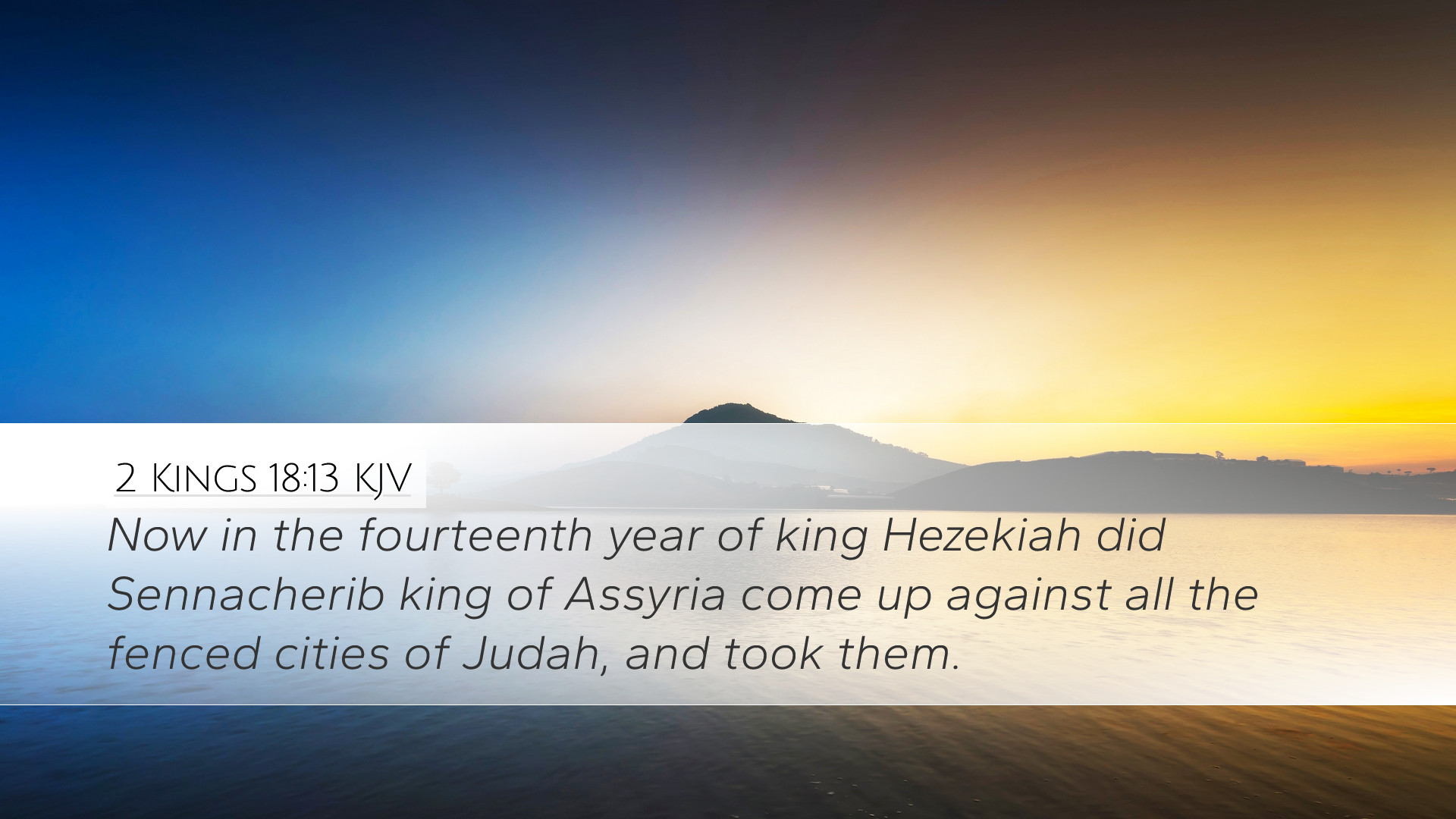Commentary on 2 Kings 18:13
Verse Context: 2 Kings 18:13 states, “In the fourteenth year of King Hezekiah’s reign, Sennacherib king of Assyria invaded all the fortified cities of Judah and captured them.” This verse marks a critical juncture in the history of ancient Israel, reflecting a time of great turmoil and significant theological implications.
1. Historical Significance
The invasion by Sennacherib denotes the aggressive expansion of the Assyrian Empire. This period was marked by the decline of Israel’s sovereign power and the rise of Assyrian influence over the region.
- Hezekiah’s Reign: Hezekiah was known for his reforms and faithfulness to God; however, he faced unprecedented challenges as a ruler.
- Assyrian Threat: Sennacherib’s military campaigns were brutal and strategic, as he aimed to consolidate Assyrian dominance over the Near East, leaving many cities devastated.
2. Theological Reflections
In this verse, the unfolding drama raises profound theological questions concerning divine sovereignty, human agency, and the consequences of faith.
- Divine Sovereignty: The text implies that even amidst turmoil, God is sovereign. He orchestrates the rise and fall of nations according to His divine plan.
- Human Response: Hezekiah’s reaction to this threat is pivotal. His faith and dependence on God would influence Judah’s subsequent deliverance, underscoring the theme of reliance on divine power in adversity.
3. Commentary Insights
Matthew Henry
Matthew Henry emphasizes the severity of the situation during Hezekiah’s reign. He reflects on the “fearful judgment” that the capture of fortified cities represented, seeing it as a divine chastisement upon Judah for their idolatrous practices. Henry notes that this moment serves as a warning for both personal and communal repentance.
Albert Barnes
Albert Barnes provides additional context regarding the political landscape of the time. He describes Sennacherib’s military might and highlights his prior conquests as a means to illustrate the gravity of the threat faced by Hezekiah. Barnes notes that this invasion tests the faith of the people and their leaders in the face of overwhelming odds.
Adam Clarke
Adam Clarke elaborates on the implications of Sennacherib’s actions as a fulfillment of prophetic declarations regarding the discipline of Israel. He points out that the Assyrian invasion was not just a political maneuver but served as divine correction for Judah’s unfaithfulness. Clarke's analysis emphasizes the importance of understanding these events within the broader narrative of God’s covenant with His people.
4. Themes for Consideration
- Faith in Crisis: Hezekiah's faith became a model for trusting God amidst crisis. This raises questions about the nature of faith when faced with despair.
- The Reality of Judgment: Reflect on how corporate sin can lead to collective consequences, calling for introspection in the lives of contemporary believers.
- The Role of Leadership: Hezekiah's leadership demonstrates the impact a ruler’s faith can have on a nation, prompting reflection on the responsibilities of modern Christian leaders.
5. Practical Applications
In light of the challenges presented by external pressures to compromise faith, believers are called to remain steadfast. This passage serves as a reminder of the importance of prayer, reliance on God’s promises, and corporate repentance as vital responses to threats against spiritual integrity.
6. Conclusion
2 Kings 18:13 serves not only as a historical account but also as a poignant reminder of the complexities of faith in times of distress. The insights drawn from the commentary of respected scholars like Henry, Barnes, and Clarke provide a multi-dimensional view that is crucial for pastors, students, theologians, and scholars. This verse invites deep reflection on the themes of sovereignty, judgment, and the nature of human response to divine providence.


